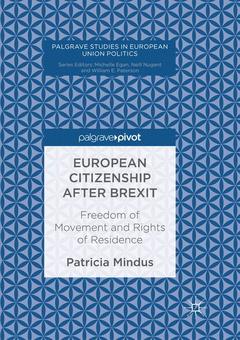European Citizenship after Brexit, 1st ed. 2017 Freedom of Movement and Rights of Residence Palgrave Studies in European Union Politics Series
Auteur : Mindus Patricia

This Open Access book investigates European citizenship after Brexit, in light of the functionalist theory of citizenship. No matter its shape, Brexit will impact significantly on what has been labelled as one of the major achievements of EU integration: Citizenship of the Union. For the first time an automatic and collective lapse of status is observed. It is a form of involuntary loss of citizenship en masse, imposed by the automatic workings of the law on EU citizens of exclusively British nationality. It does not however create statelessness and it is likely to be tolerated under international law. This loss of citizenship is connected to a reduction of rights, affecting not solely the former Union citizens but also second country nationals in the United Kingdom and their family members.
The status of European citizenship and connected rights are first presented. Chapter Two focuses on the legal uncertainty that afflicts second country nationals in the United Kingdom as well as British citizens, turning from expats to post-European third country nationals. Chapter Three describes the functionalist theory and delineates three ways in which it applies to Brexit. These three directions of inquiry are developed in the following chapters. Chapter Four focuses on the intension of Union citizenship: Which rights can be frozen? Chapter Five determines the extension of Union citizenship: Who gets to withdraw the status? The key finding is that while Member states are in principle free to revoke the status of Union citizen, former Member states are not unbounded in stripping Union citizens of their acquired territorial rights. Conclusions are drawn and policy-suggestions summed up in the final chapter.
Chapter One: Introduction.- Chapter Two: The Status of European Citizenship: An Overview.- Chapter Three: A Sudden Loss of Rights.- Chapter Four: Understanding Citizenship: The Functionalist Approach.- Chapter Five: Can Rights Be Frozen?.- Chapter Six: Who Gets to Withdraw the Status?.- Chapter Seven: Towards A Functionalist Reading of Union Citizenship.
Patricia Mindus is Associate Professor of Practical Philosophy and Wallenberg Academy Research Fellow at Uppsala University, Sweden, where she directs the project CIVIS SUM on practices of rule of law and migration policy in the EU. She works on citizenship and migration law in the EU, with a political and legal theory perspective and is a leading expert on legal realism.
Date de parution : 05-2018
Ouvrage de 123 p.
14.8x21 cm
Date de parution : 04-2017
Ouvrage de 123 p.
14.8x21 cm
Thème d’European Citizenship after Brexit :
Mots-clés :
Open Access; functionalist theory of citizenship; Citizenship of the Union; free movement of people; European nationality; British nationality; loss of citizenship; rights of Europeans in Britain; rights of British expats in Europe; withdrawing citizenship after Brexit; European law; Public International Law; status of European migrants after Brexit; British withdrawal from the EU; long-term impications of Brexit; european union politics; British Politics; citizenship



